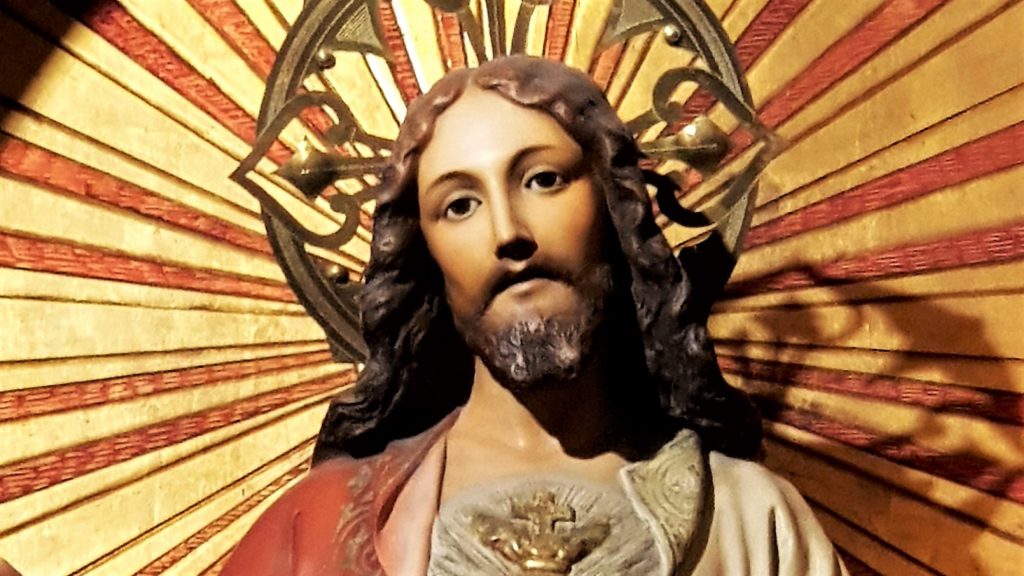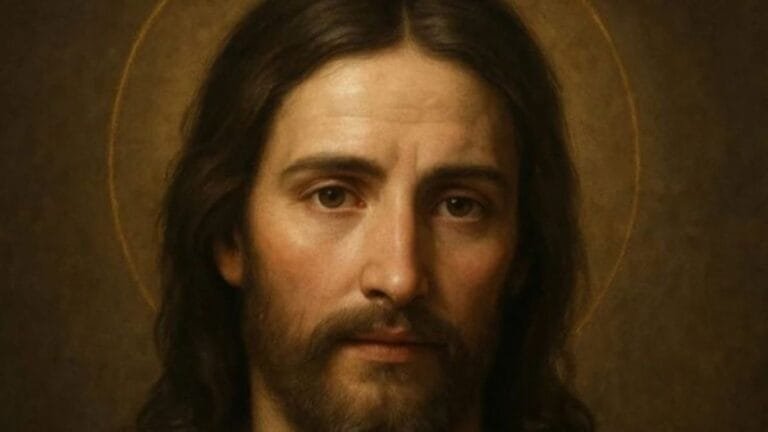POPE FRANCIS ON THE SACRED HEART OF JESUS.

HOMILY OF HIS HOLINESS POPE FRANCIS
Basilica of Saint John Lateran
Friday, 12 June 2015
In the First Reading we enter into the tenderness of God: God tells his people how much he loves them, how much he cares for them. What God says to his people, in this Reading from the Prophet Hosea, chapter 11, he says to each one of us. And it would be good to take this text, in a moment of solitude, and set ourselves in the presence of God and listen: “When you were a child, I loved you; I loved you as a child; I saved you; I led you out of Egypt, I saved you from slavery”, from the slavery of sin, from the slavery of self-destruction and from every kind of slavery that each of us knows, has had and has within. “I saved you. I taught you how to walk”. How beautiful to hear that God teaches me to walk! The Almighty abases himself and teaches me how to walk. I recall this phrase from Deuteronomy, when Moses says to his people: “Listen you,” — they were so hard-headed — “when have you ever seen a god so close to his people as God is close to us?”. And the closeness of God is tenderness like this: he has taught me how to walk. Without Him I wouldn’t know how to walk in the Spirit. “And I held you by the hand. But you did not understand that I was leading you, you believed that I would leave you alone”. This is the story of each one of us. “I held you with human bonds, not punitive laws”. With bonds of love, ties of love. Love binds, but binds in freedom; it binds while leaving you the space to respond with love. “I was for you as one who raises a child up to his cheek and kisses her. And I bent down and fed her”. This is our history, at least it is my history. Each of us can read her own history here. “Tell me, how can I abandon you now? How can I hand you over to the enemy?”. In the moments when we are afraid, at the times that we are uncertain, He says to us: “If I did this for you, how can you think I would leave you alone, that I could abandon you?”. On the shores of Libya, the 23 Coptic martyrs were certain that God would not abandon them. And they were beheaded proclaiming the name of Jesus! They knew that God, as their head was cut off, would not abandon them.
“How can I treat you as an enemy? My heart recoils within me and my compassion grows warm and tender”. God’s compassion is kindled, this warm compassion: He alone is capable of warm compassion. I will not unleash my anger for the sins that exist, for all these misunderstandings, for the fact of idol worship. Because I am God, I am the Holy One in your midst. It is the declaration of a father’s love to his child. And to each one of us.
How often do I think that we are afraid of the tenderness of God and because we are afraid of God’s tenderness, we do not allow it to be felt within us. Because of this we are so often hard, serious, punishing…. We are pastors without compassion. What does Jesus say to us in Luke at Chapter 15? About that shepherd who noticed that he had 99 sheep for one was missing. He left them well safeguarded, locked away, and went to search for the other, who was ensnared in thorns…. And he didn’t beat it, didn’t scold it: he took it tightly in his arms and cared for it, for it was injured. Do you do the same with your faithful? When you realize that one of your flock is missing? Or are we accustomed to being a Church which has a single sheep in her flock and we let the other 99 get lost on the hill? Are you moved by all this compassion? Are you a shepherd of sheep or have you become one who is “grooming” the one remaining sheep? Because you seek only yourself and you have forgotten about the tenderness your Father gave you, and it is recounted to you here, in Chapter 11 of Hosea. And you have forgotten how to give that compassion. The Heart of Christ is the tenderness of God. “How could I fail you? How could I abandon you? When you are alone, disoriented, lost, come to me, and I will save you, I will comfort you”.
Today, I ask you, in this retreat, to be pastors with the compassion of God. To leave the “whip” hanging in the sacristy and to be pastors with tenderness, also with those who create many problems. It is a grace. It is a divine grace, We do not believe in an ethereal God, we believe in a God who became flesh, who has a heart and this heart today speaks to us thus: “Come to me. If you are tired, oppressed and I will give you rest. But the smallest, treat them with compassion, with the same tenderness with which I treat you”. The Heart of Jesus Christ says this to us today, and it is what I ask in this Mass for you, and also for me.
SOURCE: https://www.vatican.va/content/francesco/en/homilies/2015/documents/papa-francesco_20150612_omelia-ritiro-mondiale-sacerdoti.html EMPHASIS MINE.

JUBILEE OF MERCY FOR PRIESTS
HOMILY OF HIS HOLINESS POPE FRANCIS
St Peter’s Square
Friday, 3 June 2016
Solemnity of the Most Sacred Heart of Jesus
This celebration of the Jubilee for Priests on the Solemnity of the Sacred Heart of Jesus invites us all to turn to the heart, the deepest root and foundation of every person, the focus of our affective life and, in a word, his or her very core. Today we contemplate two hearts: the Heart of the Good Shepherd and our own heart as priests.
The Heart of the Good Shepherd is not only the Heart that shows us mercy, but is itself mercy. There the Father’s love shines forth; there I know I am welcomed and understood as I am; there, with all my sins and limitations, I know the certainty that I am chosen and loved. Contemplating that heart, I renew my first love: the memory of that time when the Lord touched my soul and called me to follow him, the memory of the joy of having cast the nets of our life upon the sea of his word (cf. Lk 5:5).
The Heart of the Good Shepherd tells us that his love is limitless; it is never exhausted and it never gives up. There we see his infinite and boundless self-giving; there we find the source of that faithful and meek love which sets free and makes others free; there we constantly discover anew that Jesus loves us “even to the end” (Jn 13:1), to the very end, without ever imposing.
The Heart of the Good Shepherd reaches out to us, above all to those who are most distant. There the needle of his compass inevitably points, there we see a particular “weakness” of his love, which desires to embrace all and lose none.
Contemplating the Heart of Christ, we are faced with the fundamental question of our priestly life: Where is my heart directed? It is a question we need to keep asking, daily, weekly… Where is my heart directed? Our ministry is often full of plans, projects and activities: from catechesis to liturgy, to works of charity, to pastoral and administrative commitments. Amid all these, we must still ask ourselves: What is my heart set on? I think of that beautiful prayer of the liturgy, “Ubi vera sunt gaudia”… Where is it directed, what is the treasure that it seeks? For as Jesus says: “Where your treasure is, there will your heart be also” (Mt 6:21). All of us have our weaknesses and sins. But let us go deeper: what is the root of our failings, those sins, the place we have hid that “treasure” that keeps us from the Lord?
The great riches of the Heart of Jesus are two: the Father and ourselves. His days were divided between prayer to the Father and encountering people. Not distance, but encounter. So too the heart of Christ’s priests knows only two directions: the Lord and his people. The heart of the priest is a heart pierced by the love of the Lord. For this reason, he no longer looks to himself, or should look to himself, but is instead turned towards God and his brothers and sisters. It is no longer “a fluttering heart”, allured by momentary whims, shunning disagreements and seeking petty satisfactions. Rather, it is a heart rooted firmly in the Lord, warmed by the Holy Spirit, open and available to our brothers and sisters. That is where our sins are resolved.
To help our hearts burn with the charity of Jesus the Good Shepherd, we can train ourselves to do three things suggested to us by today’s readings: seek out, include and rejoice.
Seek out. The prophet Ezekiel reminds us that God himself goes out in search of his sheep (Ez 34:11, 16). As the Gospel says, he “goes out in search of the one who is lost” (Lk 15:4), without fear of the risks. Without delaying, he leaves the pasture and his regular workday. He doesn’t demand overtime. He does not put off the search. He does not think: “I have done enough for today; perhaps I’ll worry about it tomorrow”. Instead, he immediately sets to it; his heart is anxious until he finds that one lost sheep. Having found it, he forgets his weariness and puts the sheep on his shoulders, fully content. Sometimes he has to go and seek it out, to speak, to persuade; at other times he must remain in prayer before the tabernacle, struggling with the Lord for that sheep.
Such is a heart that seeks out. A heart that does not set aside times and spaces as private. Woe to those shepherds to privatize their ministry! It is not jealous of its legitimate quiet time, even that, and never demands that it be left alone. A shepherd after the heart of God does not protect his own comfort zone. He is not worried about protecting his good name, but will be slandered as Jesus was. Unafraid of criticism, he is disposed to take risks in seeking to imitate his Lord. “Blessed are you when people revile you and persecute you….” (Mt 5:11).
A shepherd after the heart of God has a heart sufficiently free to set aside his own concerns. He does not live by calculating his gains or how long he has worked: he is not an accountant of the Spirit, but a Good Samaritan who seeks out those in need. For the flock he is a shepherd, not an inspector, and he devotes himself to the mission not fifty or sixty percent, but with all he has. In seeking, he finds, and he finds because he takes risks. Unless a shepherd risks, he does not find. He does not stop when disappointed and he does not yield to weariness. Indeed, he is stubborn in doing good, anointed with the divine obstinacy that loses sight of no one. Not only does he keep his doors open, but he also goes to seek out those who no longer wish to enter them. Like every good Christian, and as an example for every Christian, he constantly goes out of himself. The epicentre of his heart is outside of himself. He is centred only in Jesus, not in himself. He is not attracted by his own “I”, but by the “Thou” of God and by the “we” of other men and women.
The second word: Include. Christ loves and knows his sheep. He gives his life for them, and no one is a stranger to him (cf. Jn 10:11-14). His flock is his family and his life. He is not a boss to feared by his flock, but a shepherd who walks alongside them and calls them by name (cf. Jn 10:3-4). He wants to gather the sheep that are not yet of his fold (cf. Jn 10:16).
So it is also with the priest of Christ. He is anointed for his people, not to choose his own projects but to be close to the real men and women whom God has entrusted to him. No one is excluded from his heart, his prayers or his smile. With a father’s loving gaze and heart, he welcomes and includes everyone, and if at times he has to correct, it is to draw people closer. He stands apart from no one, but is always ready to dirty his hands. The Good Shepherd does not wear gloves. As a minister of the communion that he celebrates and lives, he does not await greetings and compliments from others, but is the first to reach out, rejecting gossip, judgements and malice. He listens patiently to the problems of his people and accompanies them, sowing God’s forgiveness with generous compassion. He does not scold those who wander off or lose their way, but is always ready to bring them back and to resolve difficulties and disagreements. He knows how to include.
Rejoice. God is “full of joy” (cf. Lk 15:5). His joy is born of forgiveness, of life risen and renewed, of prodigal children who breathe once more the sweet air of home. The joy of Jesus the Good Shepherd is not a joy for himself alone, but a joy for others and with others, the true joy of love. This is also the joy of the priest. He is changed by the mercy that he freely gives. In prayer he discovers God’s consolation and realizes that nothing is more powerful than his love. He thus experiences inner peace, and is happy to be a channel of mercy, to bring men and women closer to the Heart of God. Sadness for him is not the norm, but only a step along the way; harshness is foreign to him, because he is a shepherd after the meek Heart of God.
Dear priests, in the Eucharistic celebration we rediscover each day our identity as shepherds. In every Mass, may we truly make our own Christ’s words: “This is my body, which is given up for you”. This is the meaning of our life; with these words, in a real way we can daily renew the promises we made at our priestly ordination. I thank all of you for saying “yes”, and also for all those many times you secretly say “yes” each day, things that only the Lord knows about. I thank you for saying “yes” to giving your life in union with Jesus: for in this is found the pure source of our joy.
© Copyright – Libreria Editrice Vaticana
SOURCE: http://w2.vatican.va/content/francesco/en/homilies/2016/documents/papa-francesco_20160603_omelia-giubileo-sacerdoti.html
EMPHASIS MINE.
Stay updated: subscribe by email for free TO OUR NEW WEBSITE www.catholicsstrivingforholiness.org (PUT YOUR EMAIL IN THE SUBSCRIBE WIDGET).
We are also in www.fb.com/Catholicsstrivingforholiness. Kindly help more people in their Christian life by liking our page and inviting your family, friends and relatives to do so as well. Thanks in advance and God bless you and your loved ones! Fr. Rolly Arjonillo

